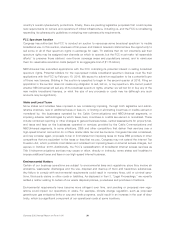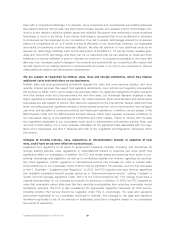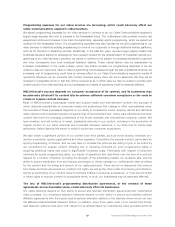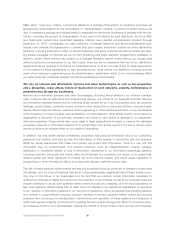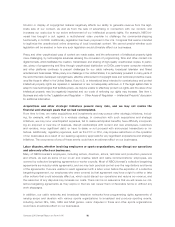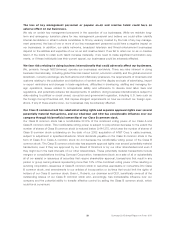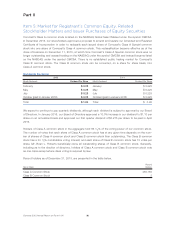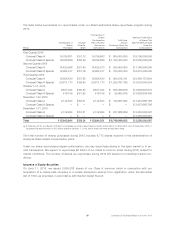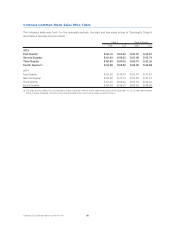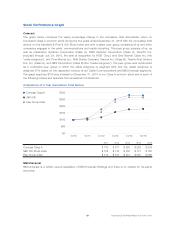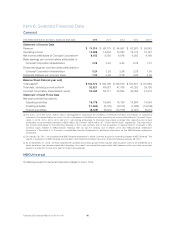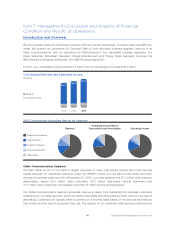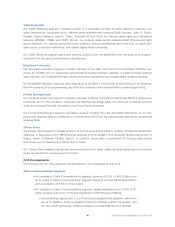Comcast 2015 Annual Report Download - page 36
Download and view the complete annual report
Please find page 36 of the 2015 Comcast annual report below. You can navigate through the pages in the report by either clicking on the pages listed below, or by using the keyword search tool below to find specific information within the annual report.The loss of key management personnel or popular on-air and creative talent could have an
adverse effect on our businesses.
We rely on certain key management personnel in the operation of our businesses. While we maintain long-
term and emergency transition plans for key management personnel and believe we could either identify
internal candidates or attract outside candidates to fill any vacancy created by the loss of any key manage-
ment personnel, the loss of one or more of our key management personnel could have a negative impact on
our businesses. In addition, our cable networks, broadcast television and filmed entertainment businesses
depend on the abilities and expertise of our on-air and creative talent. If we fail to retain our on-air or creative
talent, if the costs to retain such talent increase materially, if we need to make significant termination pay-
ments, or if these individuals lose their current appeal, our businesses could be adversely affected.
We face risks relating to doing business internationally that could adversely affect our businesses.
We, primarily through NBCUniversal, operate our businesses worldwide. There are risks inherent in doing
business internationally, including global financial market turmoil, economic volatility and the global economic
slowdown, currency exchange rate fluctuations and inflationary pressures, the requirements of local laws and
customs relating to the publication and distribution of content and the display and sale of advertising, import
or export restrictions and changes in trade regulations, difficulties in developing, staffing and managing for-
eign operations, issues related to occupational safety and adherence to diverse local labor laws and
regulations, and potentially adverse tax developments. In addition, doing business internationally is subject to
risks relating to political or social unrest, corruption and government regulation, including U.S. laws such as
the Foreign Corrupt Practices Act, that impose stringent requirements on how we conduct our foreign oper-
ations. If any of these events occur, our businesses may be adversely affected.
Our Class B common stock has substantial voting rights and separate approval rights over several
potentially material transactions, and our Chairman and CEO has considerable influence over our
company through his beneficial ownership of our Class B common stock.
Our Class B common stock has a nondilutable 33
1
⁄
3
% of the combined voting power of our Class A and
Class B common stock. This nondilutable voting power is subject to proportional decrease to the extent the
number of shares of Class B common stock is reduced below 9,444,375, which was the number of shares of
Class B common stock outstanding on the date of our 2002 acquisition of AT&T Corp.’s cable business,
subject to adjustment in specified situations. Stock dividends payable on the Class B common stock in the
form of Class B or Class A common stock do not decrease the nondilutable voting power of the Class B
common stock. The Class B common stock also has separate approval rights over several potentially material
transactions, even if they are approved by our Board of Directors or by our other shareholders and even if
they might be in the best interests of our other shareholders. These potentially material transactions include
mergers or consolidations involving Comcast Corporation, transactions (such as a sale of all or substantially
all of our assets) or issuances of securities that require shareholder approval, transactions that result in any
person or group owning shares representing more than 10% of the combined voting power of the resulting or
surviving corporation, issuances of Class B common stock or securities exercisable or convertible into Class
B common stock, and amendments to our articles of incorporation or by-laws that would limit the rights of
holders of our Class B common stock. Brian L. Roberts, our chairman and CEO, beneficially owns all of the
outstanding shares of our Class B common stock and, accordingly, has considerable influence over our
company and the potential ability to transfer effective control by selling the Class B common stock, which
could be at a premium.
33 Comcast 2015 Annual Report on Form 10-K



